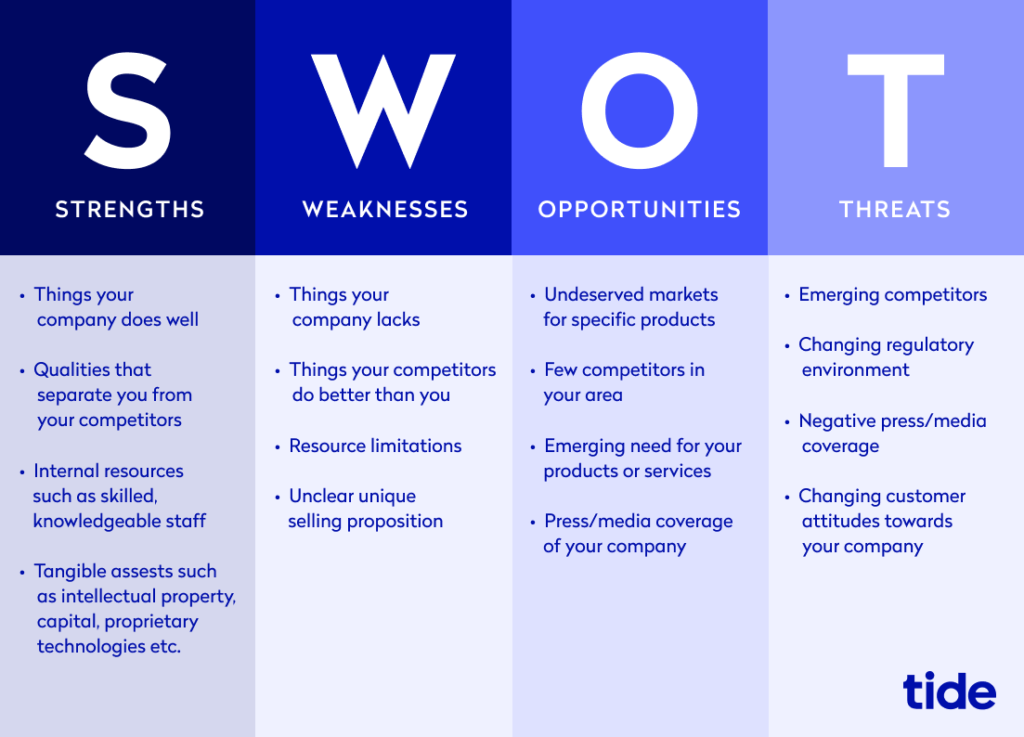
How to start a business in the UK: 9 essential steps

The UK is a booming market for startups – and in 2023, SMEs make up 99.2% of the total business population. Why? Because the idea of starting a business is exciting, and it can be incredibly lucrative.
However, there’s a lot of things to consider before jumping in. With just over a third of UK startups making it past the five year mark, it’s important to do the necessary preparation to ensure your business is successful.
In this guide, we’ll walk you through the process of starting a business from scratch, providing valuable tips to position yourself for both immediate and long-term success.
Table of contents
- Establish a solid business idea
- Conduct research on your idea
- Create a business plan
- Register your business
- Organise your finances and funding
- Insure your business
- Equip your business with the right tools
- Develop a marketing plan
- Prepare for business growth
- Wrapping up
1. Establish a solid business idea
Your business idea should solve a problem for people. While starting a business doing something you love is the dream, you also want to make sure it’s profitable and sustainable.
Finding the balance between something you love and something you’re good at is a great place to start. Once you’ve coined your idea, you can start researching growth strategies and building the foundations of your business plan.
2. Conduct research on your idea
Good business ideas come from doing plenty of market research.To identify whether your idea is viable, you can start by running SWOT analysis.
SWOT stands for Strengths, Weaknesses, Opportunities and Threats. It’s a great technique to help you analyse your business idea in more depth, and develop the right strategy.

In addition to your SWOT analysis, you can also conduct primary and secondary research to help you answer certain questions.
Primary research involves testing your business idea on your target audience using questionnaires, interviews and product trials to answer the following:
- Who will buy your product or service
- How much people are willing to pay for your product or service
- What people think of your competitors
- What potential problems your business faces
Secondary research involves looking at existing data to gather information on your potential market. Examples of this data include:
- Government data
- Recent surveys and studies
- Newspaper reports
- Recent company data
Top Tip: To learn more about why market research is valuable and the various types of market research you can do, read our guide on how to conduct market research for your business idea 🌟
3. Create a business plan
Your business plan serves as a roadmap – it outlines what your business is going to do along with your current and future goals of how you’ll achieve success.
Your business plan doesn’t need to be incredibly long, but it does need to be comprehensive. It should show that you understand the market, your target customers and your financial plan/funding strategy.
An effective business plan should include the following:
- Business summary: An overview of your business and what you plan to achieve.
- Business description: A brief description of what you plan to offer, why and who to, along with why your idea will be a success.
- Marketing and sales strategy: Details on your customers, competitors, pricing, distribution and marketing tactics.
- Products and/or services: A detailed description of the products/services you offer and how they’ll benefit your customers.
- Organisation structure: Details on your professional credentials, those of your team and the people you plan to employ.
- Business operations: Details on business location and premises, production and IT systems.
Financial projections: Details on cash flow forecasts, accounts and balance sheets. Key aspects of your financial plan should include income and revenue sources, amount of capital needed, how you plan to repay borrowings and what security you can offer lenders.
4. Register your business
Once you’ve conducted your research and your business is market-ready, it’s time to figure out the legal structure for your business.
There are three main types to choose from when starting a small business in the UK – sole trader, limited company or partnership.
Sole trader: A self-employed person who owns and runs their own business individually. Registration with HMRC is free and you keep all of the business profits after tax – which is paid through the Self Assessment tax system.
Limited company: A company with a legal identity separate from owners and directors. It limits personal liability as company finances and tax are kept separate. This usually requires onboarding an accountant to help manage this, but it’s not mandatory. Your limited company must be registered with Companies House and HMRC.
Partnership: Similar to a sole trader setup but the partnership, as well as the individuals, must be registered for Self Assessment. A partnership must dissolve if one partner leaves.
For your business to be official, you need to register with HMRC or an approved formation agent of Companies House, like we are.
At Tide, we have a business name checker where you can check your company name availability for free.
Once you have a business name, you can easily register your business with Tide for £14.99 and benefit from opening a separate business current account at the same time.
5. Organise your finances and funding
A business bank account is a key starting point as it separates your business and personal finances.
It makes you look more professional and keeps your finances more organised. As a result, bookkeeping and tax preparation will be easier to manage.
If you’re wondering how you can start a small business with no money – don’t worry, there are many ways to fund your business and cover startup costs. These include:
- Small business start up loans: You can get a startup loan or small business loan from a range of lenders to use for working capital, inventory, equipment and more. Use our business loans calculator to see how much you can borrow (this will depend on your revenue and credit score).
- Start-up grants: There are several government and EU-backed initiatives offering business grants including British Small Business Grants, InnovateUK and Horizon Europe. Grants are issued on a case-by-case basis, and if you are successful, money doesn’t have to be paid back.
- Angel investments: Angel investors are investors who give new business owners capital in exchange for equity. While they lend entrepreneurial experience to help you get ahead in the market, they will become a stakeholder and therefore will gain partial control of your business.
- Crowdfunding: This method of sourcing business capital has become increasingly popular, and traditionally involves a large number of people donating small amounts of money to finance a business venture. Alternatively you can ask friends and family to invest in return for equity or a reward.
Top Tip: One of the best ways to widen your business funding options is to improve your credit score. Register your business, open a Tide bank account, then grow your creditworthiness with Tide’s Credit Builder 🌟
6. Insure your business
To ensure a safe and protected working environment, you’ll need business insurance.
Your chosen type of insurance policy will depend on your business operations, but it’s likely you’ll require one or more of the following:
- Business contents insurance: Covering all stock and materials in the event of damage, theft, fire or natural disaster. This is required even if you work from home and have home contents insurance.
- Commercial property insurance: Covering your business premises in the event of damage, theft, fire or natural disaster.
- Professional indemnity insurance: Protecting you from claims made by unhappy clients.
- Small business public liability insurance: Protecting you against claims from members of the public who have been injured or suffered property damage due to carelessness.
- Employers’ liability insurance: The same as public liability insurance, but for employees.
Business car insurance: Covering any vehicles used for business purposes.
7. Equip your business with the right tools
Your business will run a lot smoother if you invest in the right tools – they can help you make better business decisions and save you time and money.
While this isn’t a definitive list, here are a few effective tools worth looking into when you start up your business.
| Tool | Benefit |
|---|---|
| Accounting software | Accounting software is a great tool for tracking business expenses and can help get you prepared for submitting your tax returns. If you have a small business, it can be a cost-effective alternative to getting an accountant. |
| Domain registration | When registering your company, you’ll also want to register a domain name so you have a professional email address. The first part is the name created by you, followed by .com, .co.uk etc. |
| Virtual office address | Keep your personal address private and secure a permanent virtual office address. This can save you time on admin and allows you to receive mail, no matter where you are! |
| POS device | Investing in a card reader gives you the flexibility to do business from anywhere. Whether you’re taking in-person payments, or you’re on the move, you can get paid quickly. |
| Customer relationship management software (CRM) | CRM software helps you maintain strong customer relationships whilst also saving you time – from automating tasks to tracking sales and marketing data, this is a must-have for small businesses. |
| Expense cards | Expense admin often eats into precious time that could be better spent elsewhere. That’s why team Expense Cards can be an effective, time-saving option. Give your team the flexibility and autonomy to purchase business supplies, by setting spend limits and tracking business expenses with ease. |
Develop a marketing plan
You’ve conducted your research and put together your business plan with strategies in place – but how do you start marketing your business?
There are all kinds of ways to do this: telling friends and family, attending networking events, advertising your product or service in the local press and/or online, and many more.
The most likely place to see consistent results is through digital marketing. Making up 75% of the UK’s total marketing budget, it has surpassed traditional marketing, growing by 9.6% between 2020 and 2021.
Below we list the important things to consider when marketing your business.
Get a website
Your website is essentially your online shop front and the place to send customers to find out more about you and your products or services.
Taking only 50 milliseconds to form an opinion about your website, you want to make sure its functionality is seamless.
Your website should be simple, easy to navigate and organised so that visitors see your most important messages first. To gain credibility, it should work on all devices and operating systems, and only contain true information.
Budget-friendly developer platforms such as WordPress and Squarespace let you use templates to build user-friendly websites from scratch, without prior design experience.
Optimise for SEO
Once your website is up and running, it’s important to optimise it for search engines (SEO), like Google. This involves researching keywords that potential users might use when looking for your product – and if done correctly, the search engine will point to your website.
Bear in mind that this is a long-term strategy, so you may not see a rise in traffic volumes straight away.
Deploy a social media strategy
Social media is a sure way to get the attention of potential buyers – with approximately 16.4 million consumers in the UK making purchases via social media channels.
Posting relevant content that appeals to your target audience will help drive traffic back to your website, where they can find out more about your business and the products/services you sell.
While it’s not necessary to be on every social media channel, it’s worth doing some research to figure out what the best channels are for your business specifically.
Facebook and Instagram can be good places to start, as they allow you to sell directly from your social media account. They also offer free ad training to help you market your business effectively.
Prepare for business growth
Scaling your business involves balancing your finances – keeping costs down while remaining profitable.
Whether you’re expanding marketing operations, introducing new products or collaborating with influencers, your main goal is to increase revenue and build a solid customer base.
Many businesses introduce automation technology to help manage tasks, such as lead generation, accounting and email marketing.
As your business scales, you’ll need to build a team to handle daily operations – and depending on your business needs, this could be in the form of full-time employees, contractors or freelancers.
How to build your team
There are many ways to hire additional staff. Some of the most common include:
- Job boards: post open positions, free of charge
- Recruitment platforms: help in conducting video interviews, screen CVs, and more
- Freelancer websites: find talent (long or short-term) to assist on specific projects
- Social media: LinkedIn or Facebook
Wrapping up
To start a business, it requires time, dedication, and resilience. Being methodical in your approach, with organised timelines and realistic objectives, can make all the difference between success and failure.
However, if you’re willing to commit, you have a good chance of achieving your goals.
Need some help with writing up your very first business plan? You can read our complete guide to writing your company roadmap and creating a business plan.
You can also find resources from GOV.UK’s business plan hub, including business plan templates and examples to get you started.
Ready to start your business? Register your company with Tide for only £14.99. It’s incredibly fast, easy and budget friendly. Get a free business current account at the same time, and keep your finances in order from day one. Be your own boss and register your company today 🚀
Photo by Christina @ wocintechchat.com, published on Unsplash






